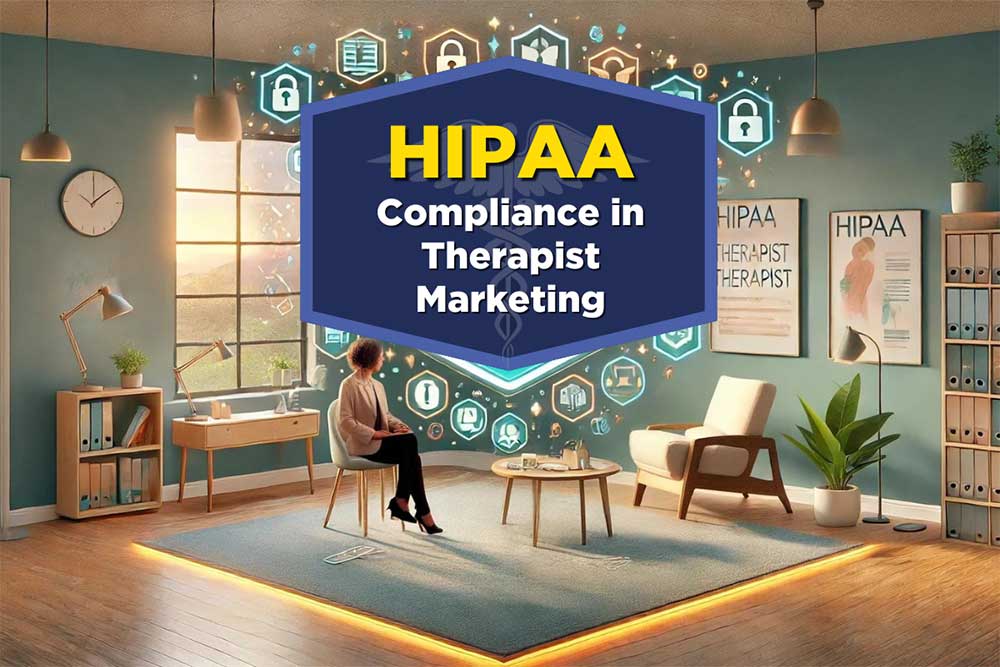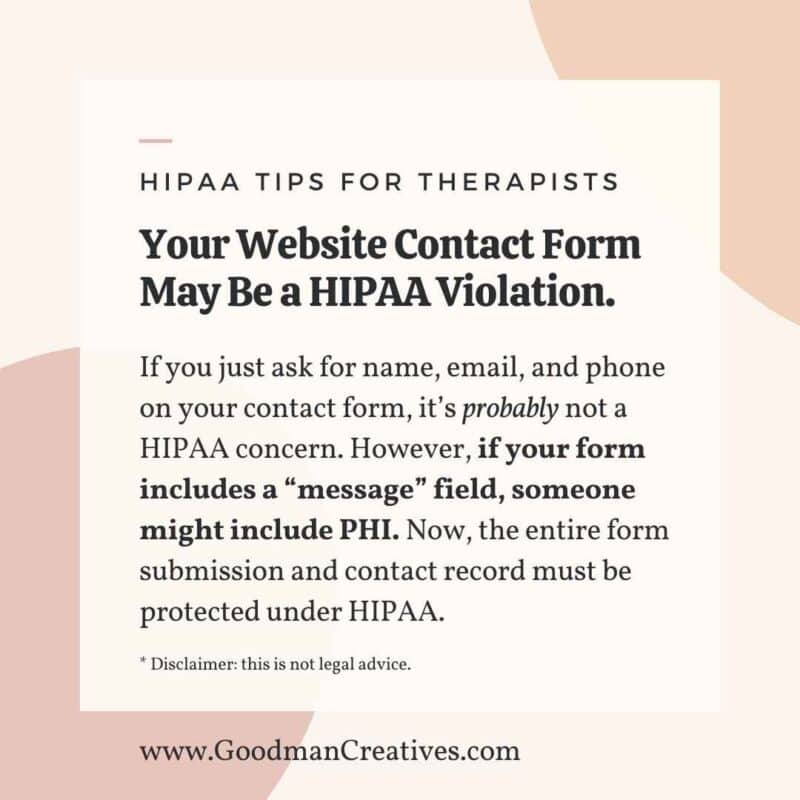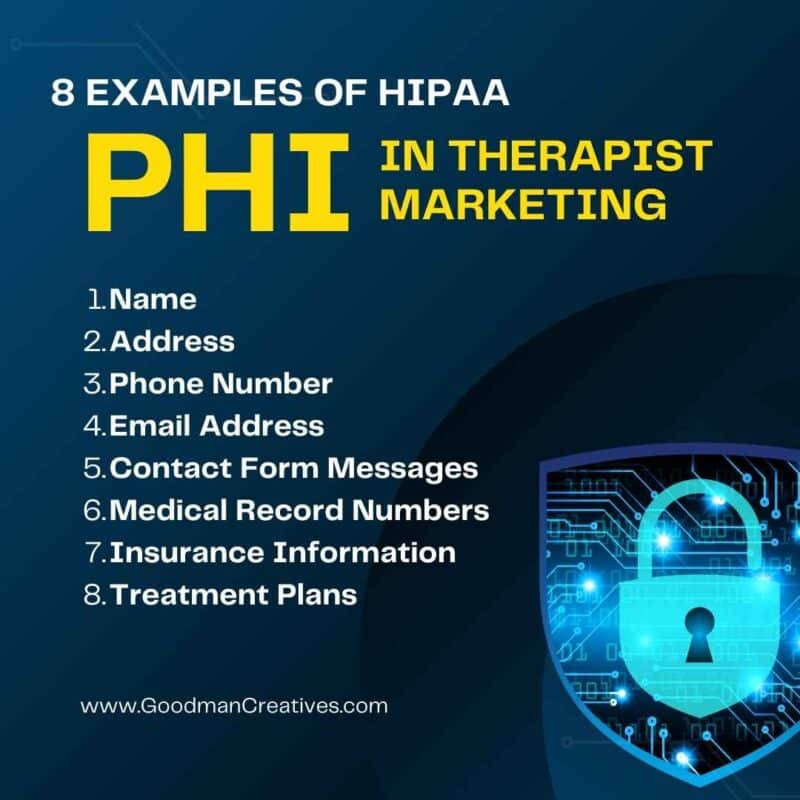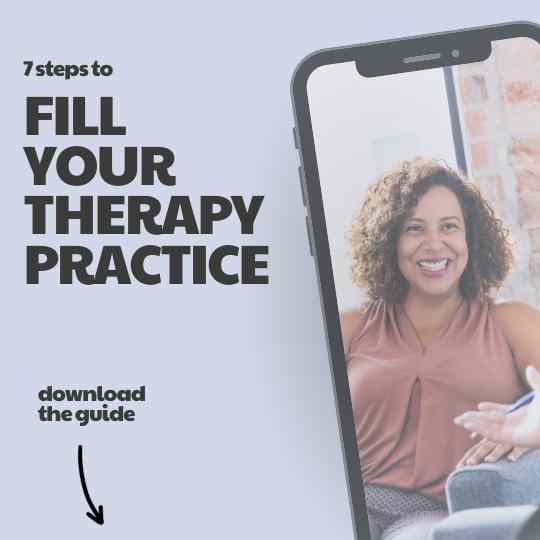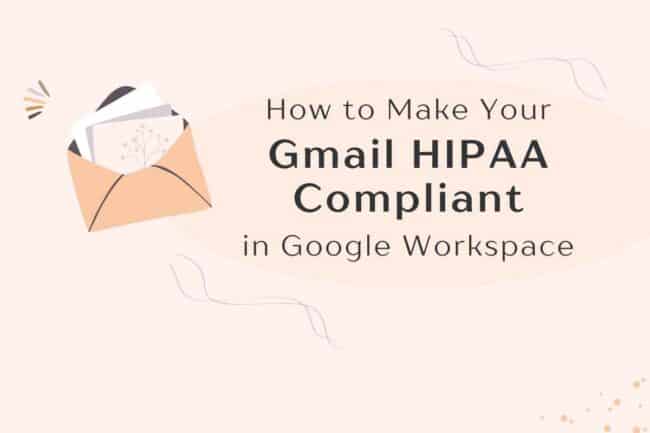Whether you manage a solo practice or a bustling clinic, the rules of HIPAA compliant therapist marketing can seem overwhelming.
Over the years, I’ve seen how easy it is for therapists to feel confused and frustrated by the myriad of rules and guidelines they need to follow. In this article, I’ll break down those challenges and share practical strategies I’ve developed to help you market your practice effectively … while protecting your clients’ privacy.
These are just some of the HIPAA questions I regularly discuss with the therapists I serve.
- What constitutes PHI in marketing?
- Do I have to worry about HIPAA before they become a client?
- Is my phone/email/text/website HIPAA compliant?
- How do you effectively promote your services while ensuring patient privacy?
- How do you use testimonials, social media, or email marketing without risking a violation?
- There are so many moving parts in the marketing puzzle. Do they all really need to follow the letter of the law?
Ahhhh! It’s enough to make a lawyer’s head spin … let alone a therapy practice owner.
When Exactly Does a Therapist’s HIPAA Responsibility Begin?
One of the biggest questions I get from therapists is, “When does my HIPAA responsibility actually begin?” This topic sparks a lot of confusion, and I’ve heard both sides of the argument throughout my career.
When I was working at a large mental health company, our very expensive lawyer assured us that HIPAA obligations didn’t kick in until someone officially became a client. However, as I’ve delved deeper into the nuances of HIPAA compliant marketing for therapists through extensive research and hands-on experience with therapists, I’ve learned that this might not be the whole story.
In reality, your HIPAA responsibility likely starts the moment a potential client reaches out—whether it’s through an initial phone call, an email, or an online inquiry.
With therapist marketing, your earliest interactions often involve handling Protected Health Information (PHI). It’s crucial to ensure that you’re protecting this data from the outset, even before the first official session. This is why it’s so important to understand the HIPAA Privacy Rule and how it applies to HIPAA compliant therapist marketing right from the first point of contact.
Whether you’re collecting names, contact information, or other personal details, you need to treat this information with the same level of security and confidentiality as you would during ongoing therapy sessions.
What Counts as PHI in Mental Health Marketing?
Protected Health Information (PHI) refers to any information in a medical record or shared during a medical encounter that can be used to identify an individual and relates to their health status, provision of healthcare, or payment for healthcare services. However, you won’t likely be getting much PHI during your marketing process. The bulk of that comes when the potential client becomes a paying client.
IMPORTANT NOTE — Information that, on its own, may not be considered PHI (like a name or email address) can become PHI when it’s combined with health-related data. For instance, a name or email address combined with information about a diagnosis or treatment would constitute PHI.
Common Examples of PHI in Therapist Marketing:
- Names: Full names or even just initials if they can be linked to an individual’s health information.
- Addresses: Including street address, city, county, precinct, and zip code.
- Phone Numbers: Any telephone number, including mobile, home, and work numbers.
- Email Addresses: Personal or work email addresses.
- Contact Form Messages: People often share personal details about their struggles, medications, or life.
- Medical Record Numbers: Specific to an individual and their health records.
- Insurance Information: Details about a person’s health insurance or claims made.
- Treatment Plans: Details of the care, services, or procedures planned or provided.
- Any Communication about Health Status: Emails, texts, or notes related to a patient’s health.
What Exactly is HIPAA?
Yes, you know HIPAA is the “legal thing” that protects a client’s privacy. You know you need to keep PHI safe and there’s a long HIPAA document that clients need to read (yeah, right, they read it) and sign before they start therapy. If that’s all you need to know, then skip this section. Otherwise, let’s dive in deeper …
HIPAA, or the Health Insurance Portability and Accountability Act, is a U.S. law enacted in 1996 designed to protect sensitive patient information. It sets national standards for the security and privacy of health data, ensuring that individuals’ medical records and other personal health information (PHI) are properly protected.
HIPAA applies to “covered entities” (e.g., doctors, therapists, clinics, insurance companies, etc.) and their “business associates” (e.g., organizations or individuals that perform services for covered entities that involve access to PHI, such as billing companies, IT services, and therapist marketing agencies).
4 Key Aspects of HIPAA:
- Privacy Rule: This rule establishes standards for the protection of individuals’ medical records and other personal health information. It dictates how healthcare providers, insurance companies, and their business associates can use and disclose PHI. The Privacy Rule also grants patients rights over their health information, including the right to examine and obtain a copy of their records and request corrections.
- Security Rule: This part of HIPAA focuses specifically on the protection of electronic PHI (ePHI). It requires covered entities to implement physical, administrative, and technical safeguards to ensure the confidentiality, integrity, and security of ePHI.
- Breach Notification Rule: In the event of a breach of unsecured PHI, this rule requires covered entities to notify affected individuals, the Secretary of Health and Human Services (HHS), and, in some cases, the media. The goal is to ensure transparency and protect patients from the potential consequences of data breaches.
- Enforcement Rule: This rule outlines the penalties for HIPAA violations, which can range from fines to criminal charges, depending on the severity of the breach and the level of negligence involved.
Key Marketing Touchpoints That Need to Be HIPAA Compliant
From your email communications and website forms to phone systems and social media interactions, each of these touchpoints must adhere to strict HIPAA guidelines to ensure that client privacy is protected at every step of their journey. In this section, we’ll explore the key HIPAA compliant therapist marketing touchpoints and provide actionable tips to help you secure them effectively.
HIPAA Compliant Therapist Websites
Does your therapist website design need to be HIPAA compliant? The answer is yes … and no. Here’s the scoop. (Please remember that I’m not a lawyer and this is not legal advice. Rather, knowledge based on experience and a lack of lawsuits)
- If your website only collects basic information like names, emails, and phone numbers, you generally stay outside of HIPAA’s strict regulations.
- If you start asking for more detailed information, such as health conditions or reasons for seeking therapy, you’re entering HIPAA territory, where the rules become much stricter
The Importance of a HIPAA Compliant Server
The server where your website is hosted plays a critical role in maintaining HIPAA compliance. If your website collects Protected Health Information (PHI), such as detailed health-related inquiries, it’s essential that the server storing this data is protected by a Business Associate Agreement (BAA). This agreement ensures that the hosting provider is committed to safeguarding PHI in accordance with HIPAA regulations. Without a BAA, even the most secure website design won’t protect you from potential HIPAA violations.
Best Practice: Embed Third-Party Forms and Apps
One effective way to maintain a non-secure web server or host while still collecting PHI is to embed third-party forms or apps that are HIPAA compliant, such as through iframes or scripts. This method allows PHI to bypass your website’s server entirely, going directly into a HIPAA compliant CRM or marketing app. By embedding forms from compliant providers, you can ensure that the PHI never touches your non-compliant server, significantly reducing the risk of a breach.
For example, at Goodman Creatives, we provide clients with Go High Level for their HIPAA compliant therapist marketing CRM. Within that system, we create contact forms and chatbots that are eventually embedded on the therapists’s website. That way, the data goes straight from the potential client into your HIPAA compliant CRM. More on that later …
- Contact Forms — If your form asks for anything more than name/email/phone, it must be HIPAA compliant. That means either having your website on a HIPAA compliant web server or using a 3rd party embed.
- Chat Bots — If your therapist chat bot collects PHI, it needs to be HIPAA compliant. This means using a chat bot platform that offers end-to-end encryption and a BAA, or embedding a compliant chat service directly into your website.
Secure Information Transfer Between Systems
Therapists often use tools like Zapier to send PHI from their website to a 3rd party software, like a CRM. Here’s the problem – Zapier (and competitors like Pabbly Connect and Integrately) are NOT HIPAA compliant therapist marketing tools. While it’s highly unlikely that anyone will ever “report you” for that (or even know), this weak link would be enough to have you fail a HIPAA audit. Therefore, it’s crucial to ensure that every step of the data transfer process, from your website to the final storage location, is fully optimized for HIPAA compliant therapist marketing.
HIPAA Compliant Phone Systems for Voice and SMS Marketing
When you’re marketing your services via phone—whether through direct calls, voicemail messages, or SMS marketing—you’re potentially dealing with sensitive information that needs to be protected under HIPAA. For example, if a prospective client leaves a voicemail that includes details about their health condition or if you discuss treatment options over the phone, this information falls under PHI. A HIPAA compliant phone system ensures that these communications are encrypted, securely stored, and accessible only to authorized individuals.
One of the challenges with phone systems is ensuring that every aspect of the communication process is compliant, from the moment a call is made to how voicemail messages are stored. Another consideration is the use of personal devices for business calls, which can complicate compliance if the device isn’t properly secured.
Therapists must also be cautious when using third-party apps or services to manage phone communications, as not all are HIPAA compliant. It’s important to verify that any app or service you use meets HIPAA requirements and offers the necessary protections, such as encryption and a BAA.
Key Features of a HIPAA Compliant Phone System
To maintain HIPAA compliance, your phone system should include the following features:
- Encryption: All calls, voicemails, and text messages should be encrypted both in transit and at rest. This prevents unauthorized access to sensitive information.
- Secure Voicemail: Voicemail messages containing PHI should be stored securely, with access limited to authorized personnel. This may also include automatic deletion features after a certain period.
- Business Associate Agreement (BAA): Your phone service provider must be willing to sign a BAA, which ensures they are also committed to maintaining HIPAA compliance.
- Access Controls: Your phone system should allow you to control who can access calls, voicemails, and messages, ensuring that only authorized individuals within your practice can listen to or view sensitive information.
- Audit Trails: A system that provides audit trails can help track who accessed what information and when, offering an extra layer of security and accountability.
Using Phone Systems in Therapist Marketing
For marketing purposes, a HIPAA compliant phone system allows you to engage with clients safely while promoting your services. Here are some examples of how you might use such a system:
- Voicemail Marketing: Leaving voicemails that remind clients of upcoming appointments or new services can be effective, but it’s crucial that these messages do not disclose any PHI unless you’re certain the system is HIPAA compliant.
- SMS Campaigns: Text message marketing is increasingly popular for sending appointment reminders, wellness tips, or promotional offers. A HIPAA compliant system ensures these texts are encrypted and secure, protecting client privacy.
- Call Recording: If you record calls for training or quality assurance purposes, make sure your system is HIPAA compliant, with encrypted storage and restricted access.
HIPAA Compliant Free Consults
You offer a free consultation to potential clients, right? Most therapists I work with do, and it’s a great way to inspire someone to reach out and see if you are a fit. Being able to say that the consult is HIPAA compliant (especially if its a video call) is a great extra “selling point” that demonstrates your commitment to their privacy and wellbeing. Here’s how to make it happen:
HIPAA Compliant Appointment Scheduling
The first step in offering a free consult is setting up a HIPAA compliant appointment scheduling system. While many therapists use SimplePractice for scheduling, it has significant limitations when it comes to marketing integration, particularly with Google Analytics and Google Ads conversion tracking. This can be a headache when trying to track the effectiveness of your marketing campaigns.
Instead, I recommend using one of these therapist appointment scheduling tools. Or, if you want something more comprehensive, check out the $300k Therapy Practice Program, which comes with HIPAA compliant appointment scheduling. Whatever you choose, make sure your calendar system has a BAA and that all client data is securely encrypted and stored on HIPAA compliant servers.
HIPAA Compliant Video Calls
As more therapists move their free consults to video, it’s crucial to use a HIPAA compliant video platform to protect client information. Platforms like Zoom for Healthcare and Doxy.me are designed to meet HIPAA standards, offering end-to-end encryption and secure data handling. Using these platforms ensures that the sensitive information discussed during these calls remains confidential and that you’re fully compliant with HIPAA regulations.
Email and SMS Reminders
To enhance the client experience, sending appointment reminders via email or SMS is a must. If you’re using a HIPAA compliant third-party appointment scheduling app, it should handle these reminders securely, keeping all communications encrypted and compliant. This not only helps clients remember their appointments but also maintains the security of their information.
HIPAA Compliant CRM for Therapists
What is a CRM? — It’s like an EHR for your marketing. It’s where you keep track of leads before they become clients.
Even if you’re a solo practitioner, having a HIPAA compliant CRM in place from the start sets a strong foundation for your practice. As your business grows and you transition from a solo operation to a group practice, a CRM ensures that you already have the systems in place to manage increased demand and scale efficiently. However, it’s crucial to understand that not all CRMs are created equal, especially when it comes to HIPAA compliance. A CRM is not meant to replace an Electronic Health Record (EHR) system but rather to complement it by managing client interactions and marketing efforts up until the point when a client’s information transitions into your EHR for clinical care.
CRM vs. EHR: Understanding the Difference
Electronic Health Records (EHRs) are designed to handle the clinical aspects of your practice, storing detailed information about your clients’ medical histories, treatment plans, progress notes, and other health-related documentation. EHRs are essential for maintaining compliance with health regulations, documenting treatment, and ensuring continuity of care. Systems like SimplePractice or TheraNest are commonly used for these purposes.
Customer Relationship Management (CRM) systems, on the other hand, focus on managing and streamlining client interactions from a business and marketing perspective. A CRM helps you track leads, manage appointments, automate follow-ups, and analyze the effectiveness of your marketing efforts. While an EHR keeps your clinical records organized, a HIPAA compliant CRM ensures that you’re nurturing client relationships effectively and maximizing the return on your marketing investments without compromising client privacy.
A CRM is invaluable for managing the entire client journey—from the first point of contact to ongoing engagement—ensuring that every potential client receives the attention they need and that your practice continues to grow, all within the bounds of HIPAA compliance.
Why Recommend Go High Level For a Therapist CRM
At Goodman Creatives, I use Go High Level as the foundation of a customized CRM that I’ve built for therapists. One of the key reasons I love Go High Level is that it provides a comprehensive, end-to-end view of the client journey. This means that as a marketer, I can track exactly how a potential client interacts with your practice from the moment they first engage with your marketing materials all the way through to becoming a client. This capability ensures that we are making the most of your advertising dollars by identifying what’s working, what’s not, and where there might be gaps in your current marketing strategy—all while ensuring that every interaction is HIPAA compliant.
Here’s why Go High Level stands out:
- Customizable and Flexible: Go High Level allows me to create workflows and systems that are perfectly aligned with your practice’s needs. Whether you’re looking to automate the intake process, send personalized follow-ups, or track your marketing campaigns, this platform adapts to how you work, while maintaining the necessary safeguards for HIPAA compliance.
- HIPAA Compliance: Ensuring that all client interactions are HIPAA compliant is essential. Go High Level offers features that protect client information, including secure appointment scheduling and communication, so you can confidently manage your practice’s marketing without risking privacy breaches. Plus, if you use my CRM system, you don’t have to pay the extra $300/month for HIPAA compliant therapist marketing. That’s included in your package.
- Comprehensive Marketing Automation: The platform’s robust automation capabilities enable you to stay connected with clients and leads without manual effort. Whether it’s follow-up sequences, reminders, or full marketing campaigns, Go High Level handles it all, freeing up your time to focus on client care.
- Data-Driven Insights: Go High Level’s analytics and reporting tools give you a clear picture of how your marketing efforts are performing. By understanding what drives client conversions and where potential clients might be dropping off, you can make informed decisions to optimize your marketing strategy.
- Seamless Integration: Go High Level integrates smoothly with tools like Google Analytics and Google Ads, ensuring that you have a complete view of your marketing performance and can track the return on your investment accurately.
Are Testimonials and Case Studies HIPAA Compliant?
Testimonials and success stories can be powerful tools for marketing your therapy practice. However, they often contain Protected Health Information (PHI), which is strictly regulated under HIPAA. Here are some key factors to consider when sharing testimonials as a part of your HIPAA compliant therapist marketing strategy:
- Written Authorization: Before you share any testimonial or success story that includes identifiable information about a client, you must obtain written authorization from the client. This authorization should clearly state what information will be shared, how it will be used, and where it will be published (e.g., on your website, social media, or marketing materials). Without this explicit consent, sharing such information would violate HIPAA regulations.
- De-identification of Information: If you want to use a testimonial or success story without obtaining written consent, you must ensure that all identifying information is completely removed. This means stripping out any details that could directly or indirectly reveal the client’s identity, such as their name, specific treatment details, or any other unique characteristics. Even with de-identified information, it’s important to be cautious and avoid sharing anything that could be pieced together to identify the client.
- Use General Feedback: Another approach to maintaining HIPAA compliance is to use general feedback or anonymous quotes that don’t contain any PHI. For example, you might share a statement like, “A client mentioned that they felt significantly better after our sessions,” without attributing it to any specific person. This allows you to highlight the positive impact of your services while minimizing the risk of a HIPAA violation.
- Training and Awareness: If you run a group practice, ensure that your staff understands the importance of HIPAA compliance when handling testimonials and success stories. Regular training can help prevent accidental disclosures of PHI. It’s also crucial to establish clear protocols for how testimonials are collected, reviewed, and published to ensure that they meet HIPAA requirements.
- Responding to Online Reviews: If clients leave reviews or testimonials on public platforms like Google or Yelp, be cautious when responding. Even acknowledging that the reviewer is a client could potentially violate HIPAA. A safe approach is to thank them for their feedback without confirming their identity or discussing any specifics related to their care. Here’s a guide from the AMA to help you learn more.
HIPAA Compliant Social Media for Therapists
When you’re sharing general mental health information on social media for therapists, you’re typically free from HIPAA concerns as long as you’re not referencing specific clients. However, the moment you share a testimonial, case study, or success story, in comes HIPAA (as you learned above). Plus, there are extra factors to consider if your clients follow you or engage with you on social media. Remember, social media is not a HIPAA compliant therapist marketing platform. Don’t let Zuckerburg, Musk, or any other tech mogul have access to your clients’ PHI.
- If a client comments on your post: Avoid any interaction that might imply they are a client. Consider deleting their post (and be ready to talk about it with them in session later). Or, just make a generic comment like “thanks for your comment.”
- If a client sends you a DM: Since social media is not secure, you’ll want to respond to them to your preferred HIPAA compliant communication channel.
HIPAA Compliant Email
Real talk – most therapists do NOT have HIPAA compliant email systems… even if they think they do. This means they will never have HIPAA compliant therapist marketing.
Ensuring that your email is HIPAA compliant involves more than just signing a Business Associate Agreement (BAA) with your email provider. While using a HIPAA compliant email service is a crucial first step, there are several other factors that can jeopardize patient privacy if not properly managed.
For example, even if your email provider is HIPAA compliant, using a non-secure phone app to access those emails could expose PHI to unauthorized access. Similarly, leaving your computer unlocked or unattended in a public space can lead to a breach, regardless of how secure your email service is. Additionally, improper storage of login credentials or failure to regularly update passwords can create vulnerabilities in your system.
Ensuring HIPAA compliance requires a comprehensive approach, covering not just the email platform itself but also how and where it’s accessed and the physical and digital security measures in place across your practice.
Is Google Workspace HIPAA Compliant?
Why Google Workspace Is HIPAA compliant — Google Workspace (formerly G Suite) can be made HIPAA compliant, provided that you configure it correctly. Google offers a Business Associate Agreement (BAA) for Workspace users, which covers services like Gmail, Google Drive, and Google Calendar. When set up with proper security measures—such as enabling two-factor authentication, using secure passwords, and controlling access—Google Workspace can securely handle PHI, making it a viable option for therapists.
Challenges — The main challenge with Google Workspace is ensuring that it is configured correctly to meet HIPAA standards. By default, Google Workspace is not HIPAA compliant; you must manually adjust settings and accept the BAA. Additionally, therapists need to be vigilant about how they use the platform, avoiding any potential misuse of tools like Google Drive for storing PHI unless they are confident in their security settings. For therapists, another concern might be training staff to use the platform securely and ensuring that all communications involving PHI are properly encrypted.
Is Microsoft Outlook 365 HIPAA Compliant?
Why Microsoft Outlook 365 Is HIPAA compliant — Microsoft Outlook 365 can be HIPAA compliant, similar to Google Workspace, when set up with the necessary security configurations. Microsoft offers a BAA for its Office 365 services, including Outlook, which provides encrypted email services, secure data storage, and other features that can protect PHI. Outlook 365 also integrates with other Microsoft services that are covered under the BAA, making it a comprehensive solution for practices needing secure communication and data management.
Challenges — Therapists using Microsoft Outlook 365 must ensure that all the necessary security features are activated, such as email encryption and data loss prevention (DLP) policies. One challenge might be the complexity of setting up these features correctly, as the default settings are not automatically HIPAA compliant. Additionally, like with Google Workspace, staff training is crucial to prevent accidental exposure of PHI, especially when integrating Outlook with other non-HIPAA compliant services or third-party apps.
Is Hushmail HIPAA Compliant?
Why Hushmail Is HIPAA compliant — Hushmail is designed specifically with security and privacy in mind, making it an inherently HIPAA compliant email service. It offers automatic encryption for all emails, secure web forms for collecting client information, and a straightforward process for entering into a BAA. Hushmail’s focus on simplicity and security makes it an attractive option for therapists who want a hassle-free way to ensure their email communications meet HIPAA standards.
Challenges: Hushmail is a pain to use, according to every therapist and client I know who uses it. You have to log into a secure link just to send/recieve an email. It makes me not want to open emails from my therapist. From a marketing perspective, it doesn’t play nice with other systems (like your CRM and online scheduling app). That said, this is probably the most reliable HIPAA compliant email solution I have encountered.
Partnerships and Business Associates
Business Associate Agreements (BAAs) are crucial to maintaining HIPAA compliance. As a psychotherapy practice, you must sign a BAA (Business Associate Agreement) with any entity that could access Protected Health Information (PHI) on your behalf. These entities are called business associates and can include billing companies, IT service providers, and even marketing consultants.
At Goodman Creatives, we sign a BAA with all clients if there’s a chance PHI will be involved. This ensures both parties are committed to safeguarding sensitive information. Your agreements should outline each party’s responsibilities, including data handling and breach notification protocols.
Conducting Risk Assessments with Partners
Regular risk assessments are vital when working with business associates and other partners. These evaluations help identify potential vulnerabilities in how PHI is managed and shared. Start by reviewing each partner’s privacy practices and security measures to ensure they meet HIPAA standards.
Risk assessments include checking for encryption, access controls, and personnel training. Additionally, document any found issues and the steps taken to address them. This proactivity can prevent breaches and mitigate potential damages. Always maintain a thorough record of these assessments as proof of due diligence in safeguarding patient information.
HIPAA in Group Practices and Therapy Clinics
Ensuring HIPAA compliance in group practices and therapy clinics requires specific measures. This includes appointment of a dedicated Privacy Officer, comprehensive staff training, and implementation of technical safeguards to protect patient information and maintain confidentiality.
The Role of the Privacy Officer
A Privacy Officer plays a crucial role in maintaining HIPAA compliance. This person oversees all activities related to the development, implementation, and maintenance of the practice’s policies and procedures. Their main task is to ensure that Protected Health Information (PHI) is kept confidential and secure.
The Privacy Officer also addresses any potential breaches or vulnerabilities and ensures that corrective measures are taken promptly. They conduct regular risk assessments to uncover weaknesses in the practice’s privacy practices. Furthermore, the Privacy Officer ensures that all staff are aware of their responsibilities regarding patient information.
Staff Training
Training your staff is essential for HIPAA compliance. All employees must be well-versed in how to handle PHI properly. Regular training sessions should cover HIPAA basics, the importance of maintaining patient confidentiality, and how to recognize and report security breaches.
New hires should undergo HIPAA training as part of their onboarding process. Training should also include practical examples and scenarios to help staff understand their role in protecting patient information. Make sure to also teach them the intricacies of HIPAA-compliant therapist marketing.By keeping staff informed and updated on HIPAA regulations, you can reduce the risk of unintentional violations.
Implementing Technical Safeguards and Compliance
Technical safeguards are technologies and policies that protect electronic PHI. These include access controls, encryption, and activity logs. Access controls limit who can view or use PHI, while encryption ensures that data is unreadable to unauthorized users.
Using secure communication methods, such as encrypted emails and secure messaging apps, is also crucial. Regularly updating software and systems to protect against vulnerabilities is necessary. Implementing these safeguards helps in maintaining the confidentiality and integrity of patient information.
By combining the efforts of a dedicated Privacy Officer, thorough staff training, and robust technical safeguards, you can ensure your group practice or therapy clinic remains HIPAA compliant.
FAQs About HIPAA Compliant Therapist Marketing
Is Google Analytics HIPAA compliant?
According to Mike Ensor at TheraPPC.com: “You might’ve heard that Google Analytics isn’t HIPAA-friendly because “Google won’t sign a special agreement.” But hold your horses! That agreement is only needed if you’re asking folks to create accounts and share personal info. Even if you do have a login page, Google Analytics doesn’t snoop beyond that. The login stuff and profile where you can upload info? That’s a whole different beast called an EHR/CRM, which plays nice with HIPAA.
So Why’s Everyone Online Saying Otherwise? Here’s the scoop:
- “Tracking tools like Google Analytics are A-OK for HIPAA folks to use on regular ol’ web pages (you know, the ones anyone can see).”
- “But they’re a no-go on pages where people have to log in or make a profile (think patient portals or telehealth sites).” (That’s the gist from HipaaJournal.com)
Now, you’ll see a bunch of places online shouting that Google Analytics is a big HIPAA no-no. But dig a little deeper, and you’ll find they’re either: a) pointing to an article that actually says you can use Google Analytics on your website, or b) telling you it’s forbidden, then trying to sell you their own fancy (and pricey) tracking tool. So, when it comes to who’s saying what, the loudest voices against Google Analytics often belong to companies trying to sell you something else. Sneaky, right?”
What are the necessary steps to ensure marketing materials for psychotherapy comply with HIPAA?
To ensure your marketing materials comply with HIPAA, use secure communication channels. Always avoid sharing any protected health information (PHI) without patient consent. Ensure all marketing platforms you use are HIPAA compliant. Regular staff training on HIPAA rules is essential to prevent accidental breaches.
Is patient consent required for all forms of marketing under HIPAA rules?
Yes, patient consent is required when using their PHI for marketing purposes. Written authorization is necessary if your marketing involves using or disclosing patient information. This includes testimonials, success stories, or any personalized promotions. Generic marketing not involving PHI does not require consent.
How do psychotherapy practices navigate HIPAA regulations in digital marketing?
For digital marketing, use HIPAA compliant therapist marketing platforms to protect patient data. Avoid targeting ads based on patient information. Ensure your website uses secure forms for inquiries and follows encryption standards. Regular audits of your digital marketing activities will help stay HIPAA compliant.
What constitutes a HIPAA violation in the context of psychotherapy practice marketing?
A HIPAA violation occurs if PHI is disclosed without consent. This could be through unsecure emails, social media posts, or unauthorized use of patient information in marketing materials. Even unintentional breaches, like mentioning a patient case publicly, can result in a violation.
Are there specific HIPAA guidelines regarding the use of testimonials in psychotherapy marketing?
Yes, using testimonials requires written authorization from the patient. The testimonial must not include any identifiable information unless explicitly consented by the patient. It’s safer to use general feedback or anonymous quotes where possible to avoid accidental breaches.
How can a psychotherapy practice use social media for marketing without breaching HIPAA privacy rules?
To use social media, never post any PHI. Avoid responding to patient inquiries in public comments; direct them to private, secure channels instead. Ensure your social media strategy focuses on general mental health tips, practice updates, and information that doesn’t involve patient details.
How much is a HIPAA violation fine?
HIPAA violations come with hefty fines. The U.S. Department of Health and Human Services (HHS) oversees enforcement. Depending on the level of negligence, fines can range from $100 to $50,000 per violation.
Levels of negligence vary:
- Unknowing violations: $100 to $50,000 per incident.
- Reasonable cause: $1,000 to $50,000 per incident.
- Willful neglect, corrected: $10,000 to $50,000 per incident.
- Willful neglect, not corrected: $50,000 per incident.
Maximum fines can hit $1.5 million per year for numerous violations. Enforcement by HHS means potential audits, so always be prepared.

